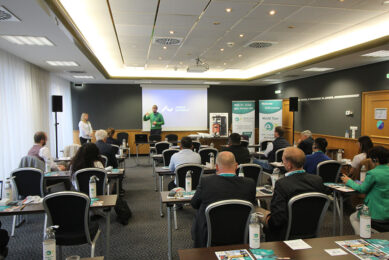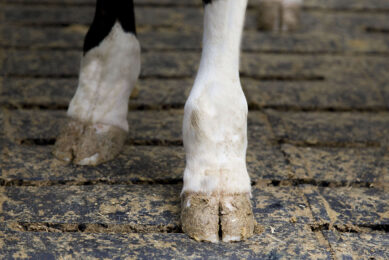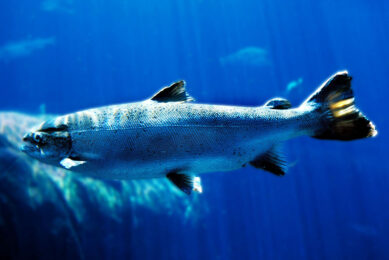Lithium-based feed additives to battle stress
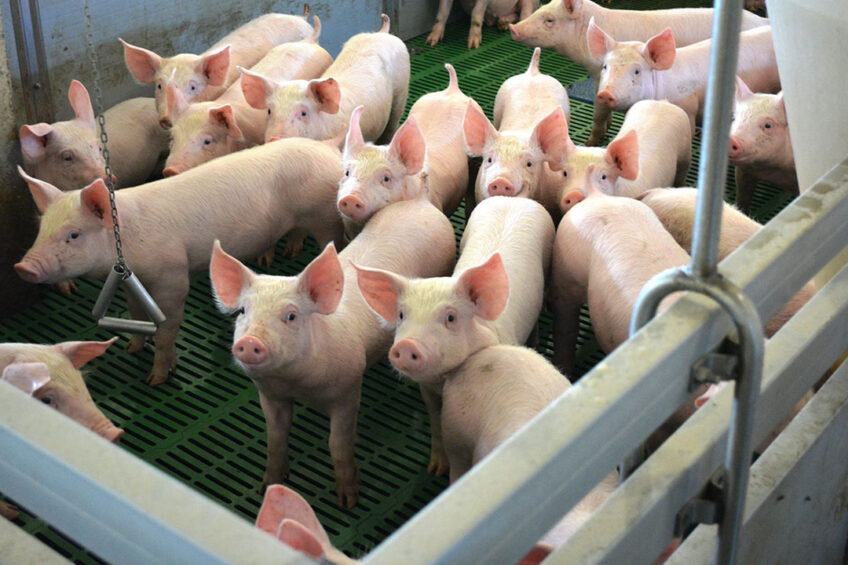
After several years of studies, Russian scientists have designed feed additives based on lithium for pigs and poultry which prevent stress in animals.
A group of scientists from the All-Russia Research and Development Institute of Livestock Physiology, Biochemistry, and Feeding in the Kaluga Region spent years developing lithium-based feed additives. As explained by Konstantin Ostrenko, Head of Laboratory of Immunobiotechnology and Microbiology at the institute, in 2020, lithium ascorbate successfully passed its ultimate field trials at Tomsky pig farm, which is operated by a major Russian pork producer Sibagro. Now that both efficiency and safety have been confirmed, lithium ascorbate is being registered as a feed additive in Russia, according to Ostrenko.
Depression in pigs
In earlier statements, the Kaluga scientists explained that modern industrial pig farms with heavy machines and a lot of noise make pigs much more prone to depression than a few decades ago. There are quite a few other reasons why pigs can be depressed: transfer from one group to another, changes in diet or weaning, and so on. Just like in humans, in some pigs, mental problems lead to weight loss, while others tend to accumulate more subcutaneous fat. As a result, farmers get less profit, without knowing what is causing the problems.
Lithium ascorbate: Positive effect on antioxidant status
A 2019 study showed that, as a result of the influence of stressors arising in the course of a standard pig production cycle, the biological functioning of the pig is also impacted. The scientists also reported that experimental data on the complex of endocrinological and biochemical parameters, among other things, indicated that lithium ascorbate in fattening pigs has a positive effect on antioxidant status.
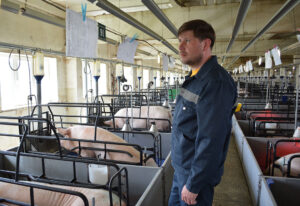
Reducing stress
Several Russian companies have already expressed interest in curbing stress and improving animal welfare. “Nowadays, in the context of intensive pig farming, the manifestation of stress on farms is not a rare thing. Animals react to any, even minor changes in farm conditions, especially in the spring and autumn. Metabolism changes and immunity decreases: the percentage of necrosis and cannibalism increases, and a decrease in productivity is seen,” said Lyubov Gordeeva, Chief Livestock Specialist of the Russian major pork producer Agropromkomplektatsiya Group. Gordeeva said that the company had already introduced some components of anti-stress therapy at its farms, adding that the company is interested in a specially developed anti-stress drug.
Lithium gycinate in broiler feed
In 2011, another group of researchers from the Russian Academy of Science discovered that adding lithium glycinate to feed positively contributed to taste parameters of broiler meat. The researchers assumed that this element could positively impact the immune system and antioxidant status, admitting that additional studies were needed to confirm that.
Broiler meat with lithium
Another group of Russian scientists moved a bit further in studying the potential of lithium in feed products, proposing a concept of broiler meat enriched with lithium. Lithium belongs to the range of essential elements. It prevents stress development, reduces the risks of oncology, prevents the formation of atherosclerotic lesions in blood vessels, and is characterised by other pharmacological features, said a group of researchers from the South Ural State Agrarian University, in Troitsk. This group has developed a feed additive named Peak Antistress.
Feed additive research: Peak Antistress
During research conducted in 2020, it was found that the introduction of the Peak Antistress feed additive in a dosage of 2.350 g per 1 tonne of feed for broiler chickens, with an ionised lithium concentration of 66 mg per 1 kg of feed, makes it possible to increase the lithium content in cooked meat, minced meat and by-products.
During a series of studies, the researchers determined an optimal inclusion ratio for their feed additive.
- The lithium content in boiled white meat was 0.418 mg/100 g, which is 211% higher than in the control sample;
- The lithium content in boiled dark meat is 0.452 mg/100 g, 426.4% higher than in the control sample.
- Similar results were obtained when determining the lithium content in the skin, heart, liver, and head of poultry.
Conclusion
Therefore, feeding 300 g of boiled meat fortified with lithium, delivered using the process of broiler fattening, provides the recommended daily amount of the specified trace element. The data thus obtained makes is possible to use raw meat and by-products for the production of lithium-fortified food products.
Lithium doses and benefits for humans
Monitoring the diets of adult people, it was found that in East Germany, the average lithium intake is 0.85 mg/day, while in the USA is is 2.0 mg/day. But in certain regions of the planet, the intake of lithium at a dose of 10 mg per day does not cause any negative consequences. It is currently accepted that a vital dose of lithium for an adult weighing 70 kg is 1 mg/day. This dose provides important neurogenesis processes, and also protects neurons from toxic substances and influences the activity of stem cells at the level of nerve tissue and bone marrow,” the scientists added.
It is widely known that lithium salts are used in psychiatry, but in this case, the doses are relatively high, ranging from 600 to 2100 mg per day. In the case of ionised lithium, this dose ranges between 110 and 400 mg. There is no information on whether any Russian company has already expressed interest in producing poultry or meat enriched with lithium.




